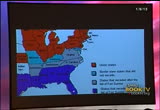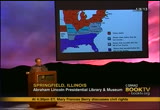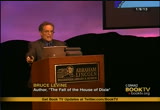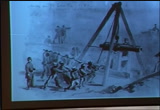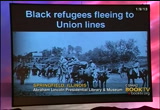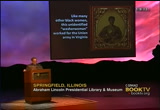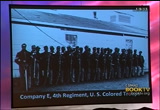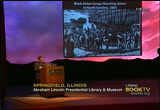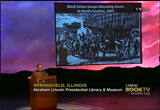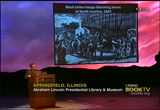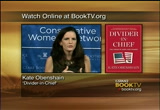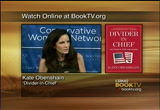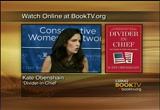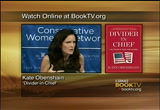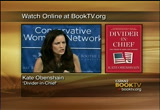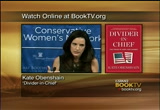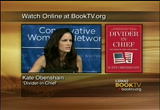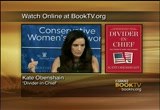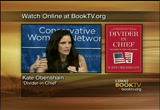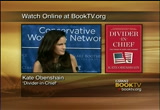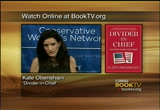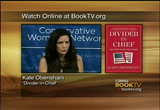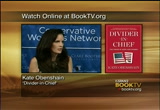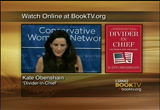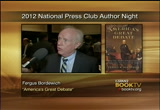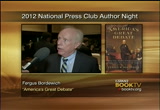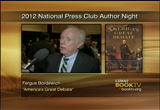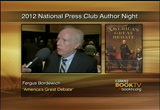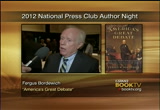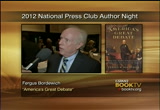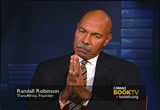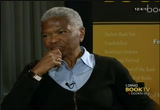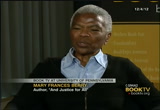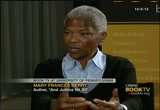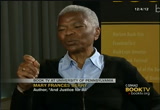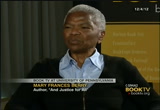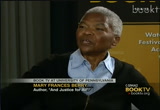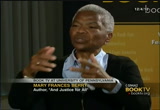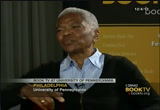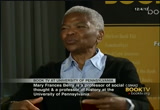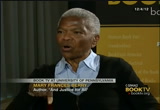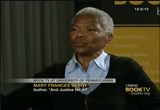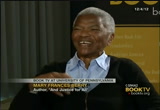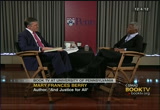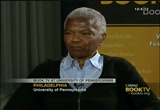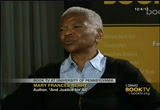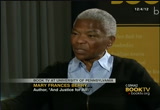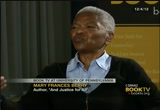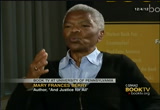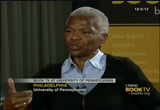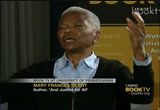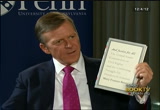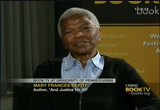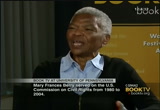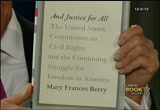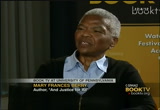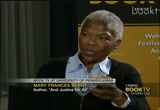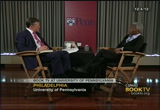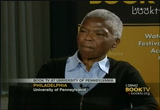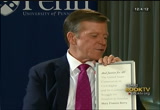tv Book TV CSPAN January 27, 2013 4:00pm-5:00pm EST
4:00 pm
at least not any more than is absolutely necessary. lincoln was sure to get other rice comes to holders of pickup lever so. second, lincoln assumes only a small minority in the succeeding states really supported secession. republicans believe the great majority of white southerners and the confederacy, non-slaveholders and slaveholders alike were
4:01 pm
basically loyal law abiding citizen who were being tricked or anti-secession and minority of extremists. leaving slavery allowed would hopefully when i'm back. that's the expectation. but after a full year of war and despite lincoln effort to spare their property and spare their feelings, precious few slaveowners producing any active sympathy to the union or union policies. this lack of support is supposedly prounion slaveowners isolde marbury son in the light at the bad news that was around that time coming from the virginia battlefield of 1862. meanwhile, it is painfully clear that confederate armies were everywhere benefiting greatly from the forced labor performed
4:02 pm
for them by slaves, and placing artillery and this sketch comic you read to be sick and wounded, tending horses, cooking and cleaning, raising the push for the population and the army. more and more republican leaders now therefore concluded that attempting to fight the war without offending the end he was impossible. concluded on the contrary that union armies must become more aggressive, must become more ruthless for the confederate leadership and in particular, concluded union armies must free slaves dramatically and large numbers.ccaa they must use them to strengthen the union war effort.
4:03 pm
slaves like these working on confederate fortifications in savanna. how did the union come to this understanding of the significance of slavery as a military factor? the courageous initiative of slaves themselves hope immeasurably to bring the union to this basic change of policy. at enormous risk an enormous sacrifice to themselves and their families, more and more time escaped from their masters is union armies approached. to do that, that you reinforce their patrols and confederate armies and this he succeeded presented themselves before union soldiers, i've trained to
4:04 pm
perform tasks of all kind of this young woman, identified in the photographs before you only as a washer women who work for the union army and virginia in exchange for sanctuary from their owners. lincoln bus came to recognize this reality and changed course. as you know, he issued his emancipation proclamation. the preliminary were in 1862 in the final one january 1st 1863 declaring the confederacy to be legally free. lincoln's attitude toward its black men serving in uniform changed under the same pressure. during the first phase of the war, his government categorically rebuffed all attempts by black men to join the fight, to showing union armies. but on this question, the need
4:05 pm
for more soldiers to fight the war ultimately prove decisive. under the pressure coming in and post. from adequately excluding blacks in 1861 and 1862 to recruit enough and soldiers in 1863. at the end of the war, 200,000 black soldiers and sailors had served in the union cause. union policy towards those soldiers and sailors change too. first they were confined almost solely to noncombat tasks, but their courageous conduct whenever they came under fire eventually it led the union to welcome black troops into combat duty. here we have been trying a black
4:06 pm
troops playing a role with slaves in north carolina, a common theme in the last year of the war. as lincoln repeatedly acknowledged, these black soldiers prove crucial to the eventual union victory, freeing and recruiting non-comic and explained tirelessly the only policy that can or could save the union. and a substantial departure from this policy he said insurers the success of the rebellion. lincoln on for size we would be powerless to save the union. most white northerners probably embraced emancipation only because it undermines a photo that sought to destroy precious humans. many others view destruction is a worthy goal in its own right.
4:07 pm
over the course of the war, many have never been on bullishness and never been particularly troubled and their conscience also came to embraced emancipation from where they merely pragmatic reasons. in the ranks of people like this, a great many republicans and soldiers of various political backgrounds. one of these with electric in minnesota who explain in early 1863 that while he had never been in favor of the abolition of slavery, his experience in this war has determined the connection that it is a greater sin than our government is able to stand and now i go in for a war of emancipation and i am ready and willing to do my share of the work.
4:08 pm
graham lincoln not opposed to slavery, moral ground, spoke for more and more when he stress the transcendent meaning of emancipation in his second inaugural address. there he suggested this terrible civil war was god's way of punishing the country as a whole are having an filched in the sin of slavery. and mccain added have been now was the fighting and destruction should continue until all the wealth piled up 250 years shall be sunk. every drop of blood shall be paid by another job with the sword. then said lincoln, one could only bow the head and agree that biblical psalmist at the jetsons of the lord archer and righteous
4:09 pm
altogether. thank you for your attention. hot mark >> i did write a snippet that michelle held up, the fraud of hope and change and i did it because i was talking to kathryn lopez, did an interview with her not too long ago. is it meant to be an awakening come as something like that? faq but it is. it stuns me that around half of the american population completely fell for this empty mantra of hope and change. the obama administration was going to be that transcendent
4:10 pm
administration that brought us all together. that is why barack obama earns the white house because he said he was going to be the great uniter. remember the beautiful inaugural address is glorious where he said to conservatives, i want to listen to you, especially when we disagree. nice coming beautiful idea. he was going to meet with conservatives in congress once a week. i was a great idea. he met twice. so three days after the speech, conservatives in congress came and had a meeting and eric cantor reticulated conservative to run increasing taxes. that we shouldn't do that. you know what obama said three days after? he said eric, i want, you must come i trump you on that. a week later he said i want the
4:11 pm
folks who got us into this mess to do a whole lot less talking and a lot more listening. you can talk a little, but he wants you to stand beside mine so we cleaned this up for you. unbelievable, condescending notion of unifying the country, bringing us together. instead kansas city mantra of attack and vilify the other side. it was just like his 2008 campaign for president was hoping change, while the speeches with no substance whatsoever. the only substance as he was going to unify us come to be that post-partisan president in almost immediately it was conservatives are hostage takers. they are the enemy. they care only about millionaires and billionaires are not children's autism and down syndrome. but with this approach? why did obama and his
4:12 pm
administration come in wanting to vilify the other side the content featured? he was bringing to the administration that philosophy of a community organizer. for years obama has said and silly community organizer, just at the national level. this was the one qualification that i think obama prior to the administration if you can even call it a qualification for president because he was a community organizer. he was a darn good one. he was known by fellow community organizers as the master of agitation. this is really important because the essence of how he views the world. obama would go into the community and identify an enemy for that group, for that community and he would stoke their animosity and really generate this angst, anger and hatred. while never on this rather pay an organization or person, he
4:13 pm
ran through his agenda. no discussion, no need for any debate or discourse, but all based on district everybody, get them focused on some entity and ran through whatever he wants. that's exactly what he had done at the national level. for the past four years there has been no philosophical back-and-forth. no dynamic free and open exchange of ideas. i wrote this book called the veteran chief not because i'm attacking division in politics. i am all for it. anyone who watches fox news, msnbc, when it's based on ideas, that's the essential premise of our country that we are free to have that dynamic and vigorous exchange. there is a very different philosophy and because they were able to have these mutual
4:14 pm
respect and it was noah's respect, but because they were able to fight it out in ideas and philosophy, we now live in the greatest, most prosperous nation in the face of the earth because the best ideas for evil to triumph because reason is left free to combat ideas that weren't that great. but we have the same the ability to be free to combat ideas. do you ever hear the obama administration defending why it works to raise taxes on small businesses on individuals who are successful? do you ever hear them say from an economic standpoint, this is how will generate more income and sustain it? it will only generate less than tom. so instead of trying to reticulated defense of their economic policies, they ripped us apart. they divided us.
4:15 pm
they start vilifying conservatives as hating poor people on the middle class. this whole class warfare thing, ripping up the part based on economic status, i was sitting there watching obama gave a speech the other day and he said 12 times the middle class. what is with that with pigeonholing us to the middle class? he that's to say about totalview, you americans come the little people, get into the middle class and stay there. first of all, why is the president of the united states responsibility to decide what class i should be in. i should have dreams to achieve whatever level of income and greatness but i want to. this country provides me the opportunity to have a pretty good shot at achieving my dreams. play by the rules, work hard, hudson has a end you can build
4:16 pm
it. you can achieve greatness. this president instead tears us apart until the nicest those who have succeeded. the breathtaking greed of the few. that is an amazing thing. to condemn those who have achieved success. we honor success, but he vilifies so he can grant through the notion ready to punish people with higher taxes. this is justification. they got there through ill-gotten gains so we must punish them. no economic rationale. and then you have conservatives arguing for lowering taxes since we passed corporate tax rate in the world on the rationale for why that works. why from an economic standpoint that produces more prosperity, how it works under ronald
4:17 pm
reagan, how jack kennedy did it, which you don't hear the same argument coming from this administration. they can't argue the facts because the facts do not back them out. they also can't come forward and have an honest discussion about what their objectives are. for us conservatives will argue our objective is to elevate everybody by increasing prosperity, by unleashing the private sector from overbearing government regulation so everybody can prosper. we believe there's an unlimited ability for prosperity. the left believes it's a fixed amount and everybody gets a slice. that's not how we see things. you don't hear the laughter ticket waiting a response to that discussion because what obama wants to do is force redistribution.
4:18 pm
if you are honest about that, his goals of not just equalize the number one, they're putting them down because that's what happens when you equalize income. if he were to be honest about that and give a philosophical difference the american people would reject resoundingly. so instead he tries to turn his 30s into the enemy. it's incredibly effect day when it's not that was powerful, creatures articulation of ideas. we've seen that when there's a vacuum our side, that hate filled rhetoric brands through. i want to talk in particular is what the clear space institute, i wanted to reticulated of the war and women. obama hasn't just kept his divisive hateful rhetoric to class warfare for work and spending. it's dividing of people, turning
4:19 pm
and people against businesses and corporations, based on faith, race. this is supposed to be his post-racial president he and that racial tensions are higher than ever in this country in terms of trusting one another. he's divided us based on immigration, saying that conservatives are the enemy because we have a different philosophy on granting amnesty and that sort of thing. but the war against woman is the most stark example of how history to pit americans against one another. i will say there probably is a war against women happening here, but it's not coming from the conservative side. it's a shame we are using words like war against women, but i'll
4:20 pm
get to that in a minute. the reality is this administration is the health and human services mandate not to have discussion about religious bertie and what religious organizations should be compelled to do, but instead is an opportunity to say we told you conservatives hate women. they want to deprive them of bear, to collect reproductive justice because conservatives do not believe religious organizations should he compal to provide an insurance program that covers something that's antithetical to their belief. because of that very rational explanation, can you reduce despise women. they are engaged in an assault. this is the language they use. conservatives are involved in an assault. we are reaching a war against women. women's health states are under attack by conservatives. that's what they say. the language is pretty serious
4:21 pm
stuff. but my favorite example of the war and women, a mantra from the leftist congresswoman sheila jackson lee always has good stuff, but sheila jackson lee talking about this conservative conservative -- get it, we are attacking women. are sold on women, sheila jackson lee said quote, the next act, by conservatives, will be dragging women out it a short ribs into the streets and screaming over their bodies as they get dragged out of getting access to women's health care. seriously that are going to do? there's no fact, nothing to back up such a profoundly misleading statement that only has put out there to incite teachers and ms. truss. mistrust of our tensions, other goodness someone an issue comes up in congress or the public
4:22 pm
discourse, statements like this statements the president, our administration has had full multi-objections from conservatives on any issue, particularly relating to women, which of course runs the gamut between abortion and birth control. that's all we care about according to plan. but it absolutely silences, is intended to silence our side. sometimes it's pretty effective, particularly among conservative men. they look at this and i guess they can't talk about issues relating to women. absolutely they have to talk about issues related to women because this affect everybody. women are concerned about the same things men are concerned about. but let's look at what the left is saying about women. let's look how tolerant and open-minded the left is.
4:23 pm
>> router with fergus board which, his new book, "america's great debate: henry clay, stephen a. douglas, and the compromise that preserved the union." what was so great about the great compromise? >> guest: most people say anything about the compromise haven't the vaguest recollection from junior high school that there's a crisis in 1850. the nature of the crisis was the country with a different civil war. most of the political culture of most americans thought it was going to take place commended the deep south is going to succeed and they were much closer to secession than most americans today realize. certainly the deep south. texas is arming other southern states. why am i talking about texas? had there been a collision that would not become in charleston. it would have begun in santa fe,
4:24 pm
new mexico. because texas with its own imperial ambitions to move westward supported by the slaveholding south came to invade the new mexico territory. there were many, many other parts of the crisis. fundamentally whether or not the west would be slaves or free. 1850 the south is militarized. other nationalism was at a peak. jefferson davis on the flow of the senate in 1850 santa fe southern confederacy was reform now, it is ready to accept the presidency of it. the north on the other hand was nowhere near ready to go to war and indeed still dominated by the conservative wing of the democratic party. in other words, the north would not have thought the war are certainly wouldn't have thought the same or and would've
4:25 pm
probably succeeded in the consequences of that not only for american history, but the rest of the world could've been quite tragic. >> host: what was the floor of congress like me tend to use? >> guest: tumultuous, chaotic, and 10. the debates in congress was like the world series today. of course there was no sports culture in the midnight to century. politics is the great american sport. american came oliver to attend to be, especially when great titans like henry clay and daniel webster and john c. calhoun and others were debating. imagine a much smaller senate chamber crowded with men who hated each other, although two
4:26 pm
although, a room reeking of cigar smoke, smelling of gas from gas lamps. carpets with spittoons scattered here and there misfitting in one direction or another, and it intends, congested atmosphere with political man and a great gladiatorial arena of america. postcode was there on the compromise? >> guest: henry clay had been in retirement. he was called out of retirement in kentucky to take charge of an attempt to create some kind of a compromise. he was not missed a great compromise their for the compromise of 1820, missouri compromise and most of the 1833
4:27 pm
compromise over south carolina's nullification of federal law. henry clay was a grand, remarkable man i never wanted to say no when he was invited to speak to the center political intentions. so he returned to washington and let the debate for seven months, attempting to persuade congressmen for the right and left, south and north to agree to a grand compromise that would solve the slavery question once and for all. he failed. repair is pivotal to the debates, but failed in making the compromise real. you put together one of the omnibus bills from the omnibus collapse. what have? stephen douglas known to journalists at the time of the
4:28 pm
steam engine in britches, very short, ferocious northern democrat, 35 years old, the marker revealed by the state perhaps did what clay had not done. he did the numbers. in other words, there were enough combinations of votes in the senate to pass a different price of clay's compromise, but not all at once, so he passed six separate bills using different combinations. so the lesson is persuasion is necessary and imperative. if you don't do the numbers, you won't succeed. these two men together symbiotically succeeded. >> host: were speaking with fergus bordewich, author of "america's great debate: henry clay, stephen a. douglas, and the compromise that preserved the union."
4:29 pm
thank you. >> guest: thank you. >> one can't count the times americans say the best country in the world. what a marvelously thing to say. of all the countries, pretty good. why do we have to believe that we are the best? what does that mean? and why do we have to assert it all the time? and what does it mean to other people who consume it. american products go around the world, information products go around the world come to search by people in every corner of the
4:30 pm
world and we teach them not to like us. >> next interview at the university of pennsylvania in philadelphia, mary frances berry share stories of her experience on the united states commission on civil rights set up by president eisenhower in 1857. this is about half an hour. >> on your screen now is a well-known face for c-span viewers. that's mary frances berry, professor at the university of pennsylvania and also the author several books. with university of pennsylvania
4:31 pm
today to chat to her about this book, "and justice for all: the united states commission on civil rights and the continuing struggle for freedom in america" . mary frances berry, when did the u.s. civil rights commission began? >> guest: the civil rights missions started in 1957. president eisenhower had a lot of discussions with john foster dulles, secretary of state, but the way the united states is in or on the road because of the racism going on that people would hear about and read about. and the fact that there seem to be a lot of episodes that kept happening, whether it is one chain or some discrimination taking place in the country said the idea was that eisenhower said he was going to ask congress to save the civil rights commission, which would put the facts on top of the table. i'm told by one of the people at the meeting that he finds the
4:32 pm
table and said they're going to put the facts on top of the table. commissions as we know, sometimes sad because there's a tough problem that people don't want to do anything about it. they get a report and it goes away. this commission was supposed to fit the facts on the table and its future would depend on how aggressive it was some of the public thought about what they were doing. >> host: this is initially a tent or a commission? >> guest: . it is to and it came before the crisis and the resultant deferment going on and eisenhower was to defuse part of the crisis and present a better match to the world and could recommend solutions would be great. >> host: who is the chair?
4:33 pm
>> guest: the idea was to put people on there who would be respect it, especially the chairman. they put the chairman who was the president of michigan state university in east lansing. they have one black member who was assistant secretary of labor and they thought he was the sort of moderate person. i didn't just serve on the commission. since i am an historian i got out the president, on the white house and that all that stuff so i can see what they were saying inside about what they were doing. so the one black guy who was an adviser in the eisenhower white house and most of us there to tell the names of people that could point to something that wouldn't get into trouble with their job. said the spoken sky won't get me in trouble.
4:34 pm
the rest of the folks on the air. a professor. an important figure so have important people to start with. >> host: mary frances berry, when did you serve as chair of the civil rights mission? >> guest: i came in 1980 after he served in the carter administration asking how enchant leather colorado, boulder, where people say was the first woman to be head of a major research university. i had to excite with ronald reagan because even though it's just a commissioner, i have long with one of my -- latina woman who was the only other minority on the commission, we would descend whenever the commission tried to descend thing terrible. so we had some problems. we had a big fight with him, but i was out there and it went
4:35 pm
throughout the site. finally it was clinton who made me share the commission. carter appointed me when i left running education. got a new department of education. >> host: at what point do you become for the civil rights commission would become a permanent agency in a sense? >> guest: after the first year , what the commission did this instead of sitting down seine which is here as a safety valve, they different hearings. the major power the commission had an ipod this in the book continues the most important thing. when it does what it's supposed to do, it will go out and listen to people nobody else will listen to. the civil rights problems that people had that they could not get anyone to pay attention. not just local people, but the federal government would write
4:36 pm
letters. nobody would pay attention. the civil rights commission decided they would go out of that they had decided and they had the power under the statute to subpoena anyone. eisenhower said the reason i want to get it passed by congress to set up an executive orders because my attorney general tells me that's the only way they can subpoena anybody. some people may not want to come to testify, said the commission has the most important power and so they went in the south and looked over the place to see what problems were and made recommendations that were controversial, but seemed to make sense. after they had been there a while, it is clear they needed to be reauthorized and continue to work on these issues. and then of course the whole civil rights movement started to heat up so it was clear there was a need.
4:37 pm
then the commission spent the next three years figuring out what to recommend to the government to bring to fruition what these people were protesting in the streets. in other words, people were protesting and going to jail and what they did is to make recommendations about what legislation would look like that might do something to alleviate these problems. >> host: professor barry, were all the members originally presented by eisenhower? >> guest: they were appointed by him and confirmed by the senate. >> host: -- >> guest: it was a bipartisan. some are democrats and some republicans. >> guest: going back to mr. wilkins also, any relation to roger wicker net today? >> guest: no, he's related to another whole family and my dear friend roger is not related to that family. that families related to a professor at harvard, but it's
4:38 pm
the chicago illinois republican wilkins is supposed to be democratic naacp line. >> host: mary frances berry, how did it change in the kennedy administration came in? >> guest: when the kennedy administration came in, i called that chapter something about being among friends because commissioners proceed to themselves, these are good solid democrats who are liberals and will do everything we say it needs to be done. they didn't know behind the scenes bobby kennedy, they were all making fun. they kept recommending all this stuff and i think were going to do this. the problem lies the committees in congress are controlled by democrats in the south and who are racist.
4:39 pm
and mcclellan, david people who control the judiciary committee and they controlled judicial appointments. since that of the friendly reception they thought they would get, they would be listened to, but the administration -- they would take recommendations and try to incorporate them later on the legislation was the civil rights force them to. until the first and two, this simply be polite and write little notes back and forth and say these people think were going to do this. we can't do any of this. so they found out and try to cooperate with the administration. what they found out that the independent didn't allow a defendant independent voice for civil rights was really important and they shouldn't try to be friendly for some
4:40 pm
particular administration. their job was to be a watchdog over what the administration was doing. they learned that and then when kennedy was assassinated him as a rights president, what they proposed this legislation and the civil rights act of 64 and 65 were enacted into law. >> host: at what point is you become aware in your life at the civil rights convention? >> guest: i became aware in a graduate program university. i forgot who asked me if i were on a a project they had good taste to hire consultants. >> host: 60s, 70s? >> guest: yeah, and i used some of the reports because the reports they did were very good reports and some of the historical research a day. i was very much aware of them. i know it by the time brophy
4:41 pm
wade was decided, the commission asked me since i do the going constitutional history if i would write something as a history of abortion rights for them and how that all plays out about the history had been back to england and so on. >> host: what is your history? are you from? >> guest: i'm from nashville, tennessee. my family and relatives are also there. and the two pearl high school enemy to howard university, graduated and went to the university of michigan. >> host: law school? >> guest: first the history department and then i went to the law school to do legal history. in those days you had to get those degrees. you can get them at the same time. now you can. i had to do one and then the other. >> host: did you convert to graduate school impervious click >> guest: i came to howard --
4:42 pm
yes, i came on purpose. i went to segregated schools in nashville arena. the high school, in those days and i went to howard and that made sense. then i went to michigan, i was one of the first students whose black who is in the phd program because when i got there, said he was surprised to see me and i found out what that man. and then he told me there was one time a came through here years ago, but he didn't graduate is what he told me. so i was sent there by my professors at howard who wanted me to work with a particular professor there in the institution. >> guest: mary frances berry, who are your parents? >> guest: poor folk who my mother, my father left his early. he was one of those lost, stolen
4:43 pm
or strayed man and my mother raised us, spent some time. that's one of my earliest memories. and then my mother raised us on her own in a very extended family in which my generation was the first generation to ever go to college. my mother graduated from eighth grade. she was a lot smarter than i am and if she could have -- she wanted to go to high school, but there is no high school to go to at that time. but she very much wanted us to get educated. >> host: when do you been interested in public policy service and government following the news? >> guest: when i started doing medical history at michigan and started leading all the legal history stuff, i did a dissertation about the draft and active during the civil war, first national draft and from
4:44 pm
reading the documents i read the materials, and even legal history, that very concerned about the power and whether there's a place for people who are not in power. how did the powerless get somebody to listen to them, which is what is of so much about the commission because i was insisting on listening to people. you know when you go to san antonio, texas and it was the first hearing the commission held on the tenets that i write about in the book. there's all these latinos who nobody's ever listen to them. and their kids are picked out of school because they spoke spanish and were told it was a dirty language. all these people -- education was awful. we listen to them. or when you go and read about
4:45 pm
the crimes runover by a car in 1951 and the commission listened to him because he was a korean war veteran. the sheriff stopped a car and shot him. not for no reason percolator cannot he shot him because he was black. the guy was paralyzed and he was a veteran. but the va wanted not to give in retention because they messed up and creating trouble otherwise the sheriff would not shot in. he shouldn't get a pension and he asked everybody to help at all the government agencies. nobody would help him. finally the civil rights commission sent investigators to find out what was going on that ended up giving him his pension. i met his family, and told him the story. they said they knew he was paralyzed course, but he never
4:46 pm
told them how this happened to him. and they like my goodness. it was the commission that day. so i think what i was interested in, but i'm still interested in is there has to be someway to have a voice for people where they can go somewhere and somebody will listen to what they have to say. >> host: have they been asked first us, particularly by congress for a particular president to disband the commission? >> guest: ronald reagan tried to do that. it always amazes me. you know, reagan is one of our most beloved president in the polls and everything else and people forget some of the stuff that happened. he wanted to change the direction of civil rights. he wanted to make sure the civil rights laws were passed in the 60s were enforced the way they were supposed to be enforced. so he decided to replace all the commissioners because the commission was standing up and
4:47 pm
watchdogging administration they did want anybody watchdogging them. so they said will change the numbers. they got into the big fight because they got to me, i sued them. i won the lawsuit. the court said the commission is supposed to be a watchdog and i say should watchdog, not a lapdog for the industry should so that they succeed in changing the commission. even though later we were able to get some traction during my time, we did things like bush v. gore, going out of the 2000 election with the voter suppression. but the commission has never been the same since that time. so vacant and a sense exceeded in making anybody but couldn't listen to ordinary people are that wouldn't listen to a very
4:48 pm
people and was not independent and they kept trying so they could endorse whatever the administration. i said if you're going to do that, they have officers and political appointees oliver government whose job is to do that. your job is to monitor them and tell the public what they're doing it to make suggestions for how things should be approved. right now in the most recent election, albeit tentative at pace across the country, the civil rights commission should have been at the center of that debate based on its history, experience developing and voting rights oppression and make recommendation. it is nowhere to be seen. so what it has done it subverted the mission it is to have. and what needs to happen is that needs to be converted to the congress into another kind of body or they ought to get rid of it. that's my opinion.
4:49 pm
it's still bipartisan, but the problem -- >> host: five members? >> guest: eight members. no more than four can be in the same political party. but people decide to do was play with the designation. when they went to appoint somebody, they haven't changed their party or change some things and then they appoint them anyway. but the way the structure is now because of what reagan did to it, it is hard to get a majority to do anything construct given the people appointed, unlike the old days back in 57 are not supposed to be people who are object is, independent-minded for him this is not a job and are widely respected across the country will be aggressive and not see themselves as catering to their own political party.
4:50 pm
postcode is the current chair? >> guest: i have no idea. i've no idea he was the chair of the commission. i haven't seen anything that it is done. it's been a decent guy that they have no idea what they're doing. >> host: elected to the support. but each of these? >> guest: i left because my term was going to be up in january. this was december 2004. when bush got reelected, i didn't see any sense in staying around for that and i was not planning to stay and i didn't want him to appoint me. that's why he left. >> host: the president gets to appoint and then the congress -- >> guest: as a result of a president they can in his post those tragic virus in the lawsuit said, congress passed a compromise as they do want these
4:51 pm
things on the compromise expanded the commission from six to eight, no more than four. the congress gets to appoint four under snow confirmation. it used to be had to be confirmed by the senate and therefore the public had a chance to see who has been appointed in two-way and if they felt like it. now they don't. she's considered a patronage position that somebody wants to appoint somebody. >> host: mary frances terry, do you have any relationship with one of reagan, republican senator at the time he served jesse helme? >> guest: jesse helme is to send me birthday cards. he had strom thurmond used to send them all the time. ronald reagan, the only interaction is at the kennedy center in the president's box and a member of congress invited
4:52 pm
me. he seemed like a very affable, personal god. the most amusing thing for me about ronald reagan as he told the press when he fired me in the press asking why, a reporter came back and told me as proprietor she stared and she's not given me any pleasure. the press got a big laugh on that one. that was almost as bad as the guy in the bush administration and the justice department supposedly granting voting rights to study the disc off the lake mary frances berry, black and bitter, but i guess bacon was a little better. i served in his pleasure, but i'm not giving them very much pleasure. the court responded to evidence when i sued reagan and the court says that among other things.
4:53 pm
the president doesn't hire people in an independent agency who are watchdogging him because they're not getting a pleasure. supposed to be monitoring what he does. but i found him to be an affable person can be a nice guy to have a with. >> host: professor berry, of what are you most proud of your service on u.s. of a commission? >> guest: i thought you're going to ask me what i was most proud of. a lot of things. being in the anti-apartheid movement. but as far as the commission is concerned, i'm very proud of the hearings begin in florida on the 2000 election because we heard again from people that nobody would listen to him they found out there were thousands of people who are registered to vote, who are the cofounders and just wouldn't let them vote. i'll never forget the minister who came in and said when he
4:54 pm
went down to the this family, they told him he was a convicted felon and he couldn't though. he said that's not true. he said the only time i've ever been to the court house and he was testifying in a case they asked me. he said they voted for in the same precinct last time. so are you telling me i'm a convicted felon? eyeless friends and neighbors just said he had to get out of here. because your felon. turns out he was in a felon. he was a convicted of anything. they bring that the information on voters and purged voter lists and anybody have any name similar to somebody else's name simply said they were felon and they were thousands of people who were in that position. so i'm very proud of the hearings because imac, but you can't add voter suppression by doing that.
4:55 pm
forget the vote act passed, but this time around, the commission didn't follow up on what was done before and we still had voter suppression in this country. >> host: what do you do here at the university? >> guest: i teach history of american law and i teach a course to anybody who wants to take it in the history of american law from english. two after reconstruction and then i teach a seminar, which i call the history of law and social change and it's about topics that i am interested in. it's one of those things very do what i'm interested in. i picked topics that have some currency, but if history had to show how the history and ask questions, does history have any place in the making of law and policy? the answers it does. what is the place that has?
4:56 pm
this semester, we are doing issues like lgb t. rights, education and the whole debate over education reform, whether it works. we discussed and analyzed them. >> host: dear ms. washington? >> guest: i miss the power in government office. no matter how small the agency and how minister the power, when people have problems, you can sometimes help them. as far as the commission is concerned, i miss being able to bring people who no one heard from, no one would listen to and listen to what they have to say. >> host: isbister theatre for the? >> guest: now, i've written many more than that. i written probably nine or 10 books. >> host: is there another one coming?
4:57 pm
>> guest: i'm working on another one right now. the topic is what does it mean mean -- it's on voter fraud. i found some documents from the place in louisiana of all places, but they seem to have a persistent record of voter fraud to the 19th century till now and it's bipartisan. so i was given some records from voter fraud that goes down that nobody else has. so i've been reading them. so this book will be about if you want to see voter suppression, here is voter suppression. >> host: when can we expect that the likes >> guest: and the next year. >> host: when you hear the term post-racial, what do you think? >> guest: i think somebody is an. i think there was a big debate
4:58 pm
about this for now, with select it by the democrat, that the idea is we are beyond noticing are thinking about issues of race. i guess that's what that means. obviously we are. too many things happen, even the presence of obama raises racial questions for some people so why we may be on the way someday to be post-racial, i think it's fair to say that we are not now. >> host: geo-relationship with president obama? >> guest: not really. >> host: and "america's great debate," her most recent book. professor at university of pennsylvania. former chairwoman of the u.s. commission on civil rights. here's the history of the u.s. commission on civil rights.
4:59 pm
139 Views
IN COLLECTIONS
CSPAN2 Television Archive
Television Archive  Television Archive News Search Service
Television Archive News Search Service 
Uploaded by TV Archive on

 Live Music Archive
Live Music Archive Librivox Free Audio
Librivox Free Audio Metropolitan Museum
Metropolitan Museum Cleveland Museum of Art
Cleveland Museum of Art Internet Arcade
Internet Arcade Console Living Room
Console Living Room Books to Borrow
Books to Borrow Open Library
Open Library TV News
TV News Understanding 9/11
Understanding 9/11